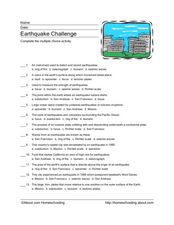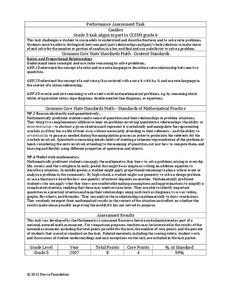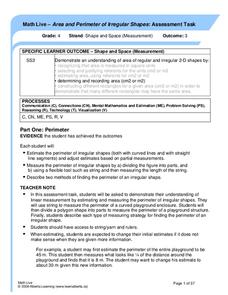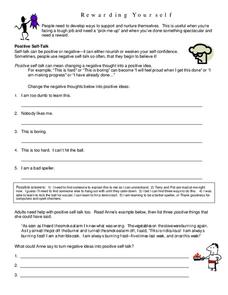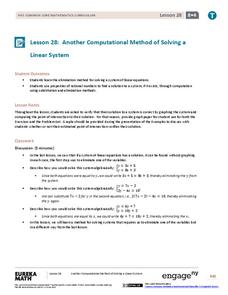Curated OER
Earthquake Challenge
In this earthquake facts review or quiz worksheet, students read descriptive statements and choose the correct multiple choice answer. Students write 13 answers.
Curated OER
Bar Graphs and Line Graphs
In this bar graphs and line graphs activity, students examine given data, organize it, and create bar graphs and line graphs from the given information. They interpret graphs and write statements explaining the graph. This one page...
Curated OER
Maintaining the Internal Environment
Explore homeostasis in animals with this all-encompassing instructional activity. Advanced biology pupils consider a variety of mechanisms for maintaining internal conditions such as temperature and waste products. Eighteen short-answer...
Noyce Foundation
Candy Fractions
While examining fractions and ratios, your leaners get to read about one of their favorite subjects: candy! There are four word problems on this worksheet. Learners consider situations in which "for every x caramels there are y...
Curated OER
Adding Fractions
Each of these 20 fraction pairs needs to be totaled, but that's not all there is to do! Scholars find the least common denominator first, then reduce the answer to simplest form if needed. These practice problems are excellent in the...
Curated OER
Factors of Numbers from 31 to 65
Finding factors is an integral aspect of multiplication. Although there are two examples here, they don't illustrate the process so you will still need to model this a few times for scholars. First, mathematicians list the factors for...
Curated OER
Multiplying Fractions
As pupils are learning how to multiply fractions, use guided worksheets like this one to help them keep track of the multi-step process. Scholars solve 24 equations, some of which have one whole number and one fraction. For all of these...
iCivics
No Rambling Allowed
What makes for a strong persuasive argument? Organization! After deconstructing a sample argument and then following the guidelines of an included worksheet, your class members will learn how evidence can be organized in order to produce...
State of Victoria Department of Education
Dealing with Grief and Loss
Loss is something that everyone has to deal with, but that doesn't make it easy. Help children develop their coping skills with this collection of worksheets, providing them an opportunity to remember their loved ones through different...
Alberta Learning
Area and Perimeter of Irregular Shapes
Evaluate young mathematicians' understanding of area and perimeter with this series of three assessment tasks. Challenging students to not only calculate the area and perimeter of irregular shapes, but to explain in writing their...
West Contra Costa Unified School District
Connecting Graphing and Solving Absolute Value Equations and Functions
Can you solve an equation graphically? Absolutely! This Algebra II lesson makes the connection between solving an absolute value equation and graphing two functions. Graphing absolute value functions is presented through the process of...
Choose My Plate
MyPlate Word Blanks
Create a silly cooking themed story using nouns, adjectives, verbs, and more! Pupils fill in the blanks using their knowledge of different types of fruit, vegetables, grains, protein, and dairy, then read the story aloud to hear a...
University of Washington
Rewarding Yourself
Everyone experiences negative self-talk from time to time, but how can youngsters learn to take it easy on themselves? Use an activity that focuses on talking positively to oneself, including giving yourself compliments and spending...
Mathed Up!
Negative Numbers
Eight independent worksheet pages challenge scholars to solve 12 problems that focus on negative numbers in the context of temperature in degrees of celsius.
Teach Engineering
Earthquakes Living Lab: The Theory of Plate Tectonics
Find out if your class agrees with Ice Age: Continental Drift ... or if it's just a fun family movie! Class members research the theory of continental drift, examine evidence of plate tectonics, connect...
Charleston School District
Solving with Inverse Operations
What does order of operations have to do with solving equations? A video explains solving two-step equations using a do/undo chart. Learners recognize the operations within an equation and use inverse operations to undo those...
Teach-nology
The Synonym Drop
Reinforce grammar instruction with a synonym activity equipped with 12 fill-in-the blank sentences. Scholars read each sentence focusing on the underlined word, then choose between two additional words that best make a synonym pair.
It's About Time
Adaptations
Congratulations! You exist, thanks to the wonders of biology and adaptations. The focus of the lesson explains many adaptations of plants and animals and how the environment has influenced the process. A hands-on activity...
English Worksheets Land
Out to Lunch
Enhance instruction and practice reading with a worksheet that doesn't just ask scholars to identify a sentence's point of view, but also poses the question, How do you know?
Curriculum Corner
Unit Rate Problem Solving
Eight word problems and a well organized answer sheet make up a practice page designed to reinforce unit rates.
EngageNY
Another Computational Model of Solving a Linear System
The process of elimination really works! Use elimination when substitution isn't doing the job. The 29th segment in a series of 33 introduces the elimination method to solving linear systems. Pupils work several exercises to grasp the...
Mathematics Assessment Project
Modeling Motion: Rolling Cups
Connect the size of a rolling cup to the size of circle it makes. Pupils view videos of cups of different sizes rolling in a circle. Using the videos and additional data, they attempt to determine a relationship between cup...
Noyce Foundation
Digging Dinosaurs
Build a function to solve problems rooted in archeology. A comprehensive set of five lessons presents problems requiring individuals to use functions. The initial lesson asks learners to find the possible number of dinosaurs from a...
Noyce Foundation
Tri-Triangles
Develop an understanding of algebraic sequences through an exploration of patterns. Five leveled problems target grade levels from elementary through high school. Each problem asks young mathematicians to recognize a geometric pattern....


